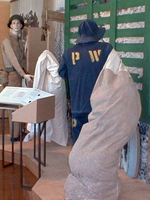
Randall Sr., Robert E.About | Story: POWs and Their Guard Look Out for Each Other | Abstract AboutDescription of events leading to assignment as guard at prisoner of war camps in Lordsburg and Hatch, New Mexico, during World War II. Describes differences between Italian POWs who were "king's men" and "black shirts." Description of duties, prisoners, and relationships between guards and prisoners.
Story: POWs and Their Guard Look Out for Each Other
Robert Randall: I always treated those prisoners of war right. Now, some of those guards were real dogs. Very mean to the prisoners. Very strict and, of course, there wasn't a good relationship there. I'm going to tell you something here that will show you the relationship that I had out on the farms. I used to sit under a tree, and I would doze off. And those prisoners would come and wake me up when they seen the sergeant of the guard. They could see the sergeant of the guard comin', and they would come over to me, and they would say, "Sargente, sargente!" So, I would get up an' stand up an' shoulder my rifle. Ron Nelson: Well, there was a mutual respect there, I guess. RR: Mutual respect. They took care of me. I never had no problem. But I would wake up and count the prisoners. Many a time. And invariably there would be one or two or three missing. But I know where they were. They had 'em a señorita down the road. I never reported it. I never said nothing about it, and at four o'clock—time to quit—they were back. Now had I reported them, I wouldn't have been able to doze. No way. So we got along very well and, like you say, mutual respect. Prisoners never gave me a hard time. Never talked back. Never was unruly. Abstract
Tape 1, Side A
Robert E. (Bob) Randall entered the army on March 25, 1943. He went to limited service school at Camp McCoy, Wisconsin, and had Military Police Escort Guard (MPEG) training at Fort Custer, Michigan. He was sent in October of 1943 to Lordsburg, New Mexico, to guard Italian prisoners of war. Mr. Randall describes the physical layout of the square-mile camp and describes his duties as a guard in one of the towers that were placed about each quarter-mile. He describes the tarpaper hutments for prisoners and guards, the arrangements for the Italians to cook for both themselves and guards, and the communication between the camp staff and the prisoners. Orders were directed to the Italian officers who transmitted them to the non-commissioned officers who passed them to the enlisted men. The Italians, Mr. Randall says, were either king's men and loyal to the monarchy or were black shirts and loyal to Mussolini. The two factions did not get along. He said there were about 500 guards and 10,000 prisoners in Lordsburg when he was there. Randall stated none of the prisoners was taken out to do farm or ranch work during that time. Mr. Randall related that a lieutenant would take guards out to the desert for training on their day off His captain was Captain Williams. Around early November 1943, about 150 prisoners and 30 guards were sent to a new sub-camp in Hatch, New Mexico, where the prisoners worked on area farms. After one escape attempt, all the soldiers and prisoners were sent back to Lordsburg.
Tape 1, Side B
In Lordsburg the army separated the king's men and the black shirts, then sent the king's men and their guards back to Hatch and to various other sub-camps in the Mesilla Valley. Mr. Randall said there were no discipline problems with the king's men. He said they worked at the Franzoy farm, the Mundy farm, and Black's dairy. He described good relations and mutual respect between himself and the prisoners but said some of the guards had a harsher attitude toward the prisoners. The consultant talks of playing checkers with the prisoners. He took them to a talc rock near Rincon to get pieces of rock so they could make figurines, and said they also made a concrete monument with their insignia on it. He took them to a Catholic church in Rodey and to the movies in Hatch. Mr. Randall was reclassified for general service and trained as a corpsman. He was assigned to William Beaumont Hospital in El Paso. While he was there Italy surrendered and former Italian prisoners of war were housed at Fort Bliss in El Paso. He said he met some of the Italians he used to guard and described their cordiality to him. Mr. Randall believes that after the armistice with the Italians, German prisoners of war were located in Hatch in 1944. |
